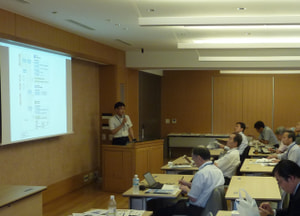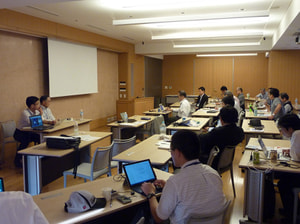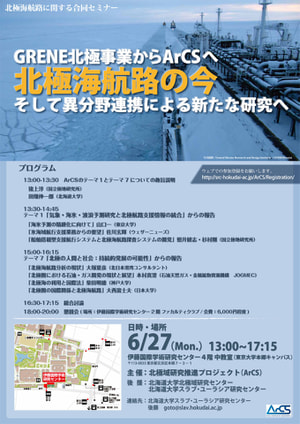The joint seminar between Theme 1 “Predictability study on weather and sea-ice forecasts linked with user engagement” and Theme 7 “People and community in the Arctic: Possibility of sustainable development” was held on June 27. The member researchers of each group discussed the topic of the Northern Sea Route (NSR). The purpose of this seminar is for the researchers and the stakeholders, gathering in the same hall, to present their own knowledge and discuss to find the best way of collaboration to make the NSR fit for practical use. First, the principal investigator of each group introduced the theme and course of the investigation, followed by presentations made by researchers of Theme 1 and 7 in turn.
The main task of Theme 1 is to improve the precision of forecasting weather and ice conditions in order to make use of the NSR. Hajime Yamaguchi (the University of Tokyo) in his presentation pointed out the interval of data assimilation of sea-ice extent is a key factor for the skillful sea-ice prediction and navigability over the NSR. Next, Genki Sagawa (WEATHERNEWS INC.) showed that it is essential to consider such dynamic factors as speed of vessels, stress of ice, and force of wind along with the conditions of ice, since they all affect navigation through sea-ice. Further, Takeshi Terui and Takeshi Sugimura (NIPR) introduced the development of the Vessel Navigator by Unitized System (VENUS) and the Arctic Route search system by showing some examples of their practical use.
On the other hand, the members of Theme 7 mainly comprise researchers of the humanities and social sciences, and the presentations were focused on economic development and governance of the Arctic Ocean. In his presentation, Natsuhiko Otsuka (Former North Japan Port Consultants Co.,Led.) pointed out that it is crucial in making use of the NSR to take into consideration inclusively the social environment such as infrastructure, economic efficiency, and governance. The next speaker Masumi Motomura (JOGMEC) indicated that the Arctic Circle is coming to be reevaluated because of its resource potential. And he reinforced the meaning of resource development, which can contribute to the development of regional order. From the viewpoint of international law, Akiho Shibata (Kobe University) indicated the necessity of grasping the power balance between the international regimes and the coastal countries. Finally, considering Arctic maritime governance, Fujio Ohnishi (Hokkaido University / Nihon University) reminded us that political stability is requisite to practical use of the NSR.
In the following discussion, the participants of the seminar agreed that the NSR should be a model of collaboration in the point that the future course of knowledge should be determined through interaction among researchers of the humanities and social sciences and natural sciences, and that consensus on the knowledge should be obtained through practical use of the NSR.
Masanori Goto
(Slavic-Eurasian Research Center, Hokkaido University / A member of theme 7)
 Theme 1 PI Inoue introducing the joint seminar
Theme 1 PI Inoue introducing the joint seminar






